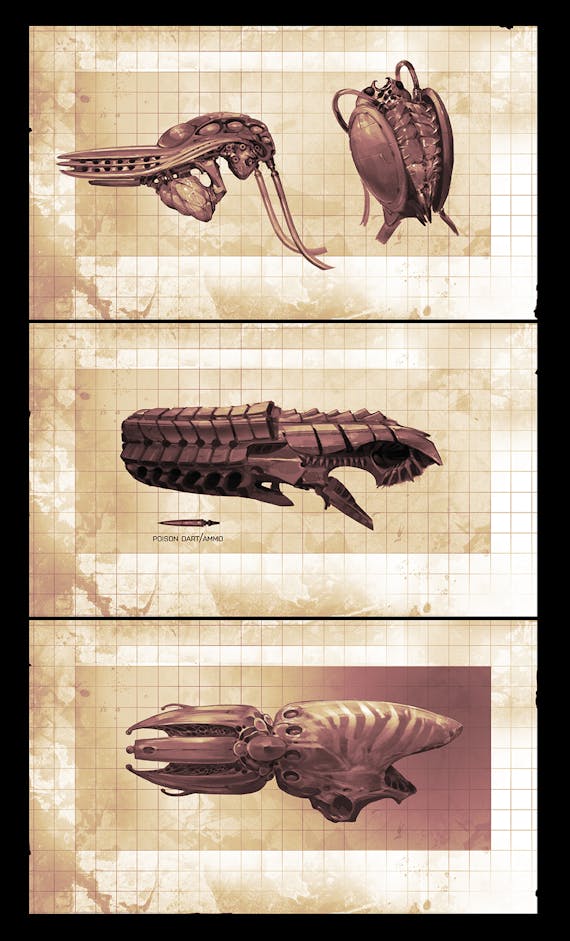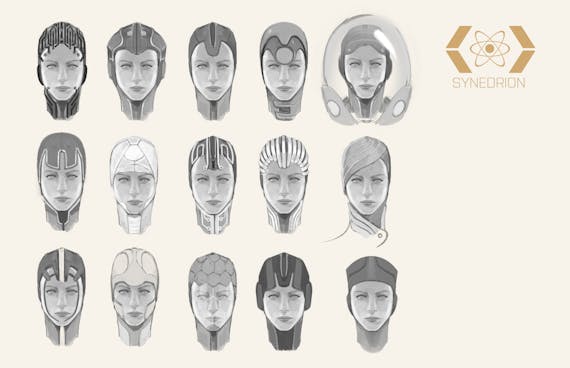Synedrion
By Allen Stroud
--------
For centuries, humanity has fought itself in some strange corrupted mockery of Darwin's theory. The arrival of the alien changed all that and provided us with an opportunity to unite.
We believed we were the Earth’s masters, that we knew better than nature. In our arrogance, we exploited the resources of our world, striving to dominate the ecology that birthed and supported us. It was only a matter of time before we were supplanted, just like the animals before us.
Now we must form a new society, learning from our wounds and the scars of our world. The alien is not our enemy unless we choose to oppose it. Our existence is not determined by this, nor defined by the destructive capacity of our predecessors.
So, we must begin again and go back the start. We must look at biology, chemistry and archaeology with new eyes, taking into account what we’ve learned.
The work has begun. Already we have made inroads, identifying weaknesses and sources from fragmented records. Collecting the knowledge of the past is essential to us finding a place in the future.
Whatever bred these creatures and destroyed our civilisation came from our oceans, the most remote parts of our ecology. Nature evolved answers to germs and viruses. It is in nature we must look for answers. Life is diverse, resistant and powerful. Life evolves and finds strength in subtle ways, but this process is slow and wasteful. We don’t have thousands of years, we have hours, days, weeks and months. Only by experimentation and ingenuity can we shortcut this process.
Life has always found a way. In flora and fauna we will seek out answers that will allow us to defend ourselves, establishing safe territories where we can build new settlements for future generations. The destruction of our past is an opportunity for us to learn humility, to find a new path that leads us to co-existence with whatever comes next. We cannot seek to dominate this world, we must learn to accept being a part of it.
--------
Phoenix Project Comment:
Synedrion represents an intelligent and articulate ideology that has found its voice amidst the devastation of the past. The old ways are lessons of history for a new path and a new society. Great thinkers, ignored in previous struggles between neoconservatives and neo-liberalists are redeemed in the Synedrion vision for a different future.
In many ways, Synedrion is our competitor and a potential colleague. Much of its vision is an enlightened alternative that looks to make a new civilization out of what remains of the old that accommodates the changes to our world. These people intend to press forward in creating a new global nation that seeks a partnership with its citizens and its environment.
Synedrion shares our goal in preserving important knowledge from the past, but looks to adapt this knowledge into a new ecological equilibrium with our world. This equilibrium extends to the alien, who they believe should be accepted as part of their new environment and incorporated into a wider plan of co-existence. Essentially, the alien threat is seen as one amongst many ecological imperatives, which up until now, humanity has attempted to tame or ignore in much the same way as it has attempt to define itself in a subjugated hierarchy.
In practical terms, the decentralised but interconnected organisation of resources and knowledge that is part of Synedrion’s philosophy relies on stable communication networks. Where these don’t exist, the individual settlements become more fragmented from the whole and prioritise self-sufficiency. That said, their philosophy of preservation and sharing can be advantageous to us, unless we are seen to contradict their cohabitation strategy and are seen as regressive.
If this happens, it is likely they will no longer work with us.
Declaration of Principles (Version 2.1)
The following are the core principles of Synedrion, as voted upon by its citizens:
FREEDOM. The freedoms cherished by Synedrion include freedom of speech, freedom of the press, freedom of belief, freedom of assembly, and freedom of movement. They also include freedom from hunger, freedom from violence, freedom from exploitation, freedom from arbitrary/stereotypical cultural norms, and freedom from hierarchies.
RIGHTS. Synedrion fundamentally values all human beings equally, and asserts that all human beings have inalienable rights. These rights exist regardless of talent or ability; they do not need to be earned, but must be defended.
ECOLOGY. Synedrion understands that humanity occupies a unique role in the ecology of the planet. As the only species fully conscious of its impact on its environment, humanity is both uniquely valuable and uniquely responsible. This does not mean taking a mystical or idealist approach to the natural world, but employing reason to create a system of industry that allows both humanity and the global ecology to flourish.
COMMUNALISM. Synedrion rejects the notion of private ownership of the fundamental resources and tools of society, instead placing these in the hands of all citizens. Systemic decisions must be driven by reason, not markets. From each according to his ability, to each according to his need; this is the basis of true individualism.
CONFEDERALISM. Synedrion is not a nation state, but a confederation of municipal popular assemblies, a community of communities rooted in direct democracy and common principles. Synedrion does not have a leader, only representatives.
REASON. Science and technology are the greatest achievements of the human species; their correct application, previously hindered by outdated systems, will allow the creation of a free and ecologically functional society. The alien threat must neither be mystified nor demonized, but treated as a material phenomenon that can eventually be understood and dealt with.
PACIFISM. While the use of violence in self-defense may be inevitable is certain situations in the current state of the world, the citizens of Synedrion assert that long-term solutions to systemic problems must come from structural change and scientific progress, not merely the destruction of an opposing force.





































![Glory to Codexia! [2012] Codex 2012](/forums/smiles/campaign_tags/campaign_slushfund2012.png)








